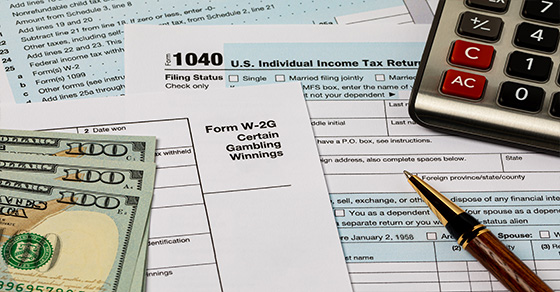With the recent legalization of sports betting in Kentucky, and many other states either having already or soon-to-be following suit, we wanted to give some reminders when it comes to gambling winnings. Always remember, there are tax consequences attached to your good fortunes!

Winning at gambling
For tax purposes, it doesn’t matter if you win at the casino, a bingo hall or elsewhere. You must report 100% of your winnings as taxable income. They’re reported on an “Other income” line of your 1040 tax return. To measure your winnings on a particular wager, use the net gain. For example, if a $40 bet at the racetrack turns into a $130 win, you’ve won $90, not $130.
You must separately keep track of losses. They’re deductible, but only as itemized deductions. Therefore, if you don’t itemize and instead take the standard deduction, you can’t deduct gambling losses. In addition, gambling losses are only deductible up to the amount of gambling winnings. So you can use losses to “wipe out” gambling income but you can’t show a gambling tax loss.
Maintain good records of your losses during the year. Keep a detailed diary in which you note the date, place, amount and type of loss, as well as the name of anyone who was with you. Save all documentation, such as checks or credit slips.
Note: Different rules apply to people who qualify as professional gamblers.
Winning the lottery
Of course, the chances of winning big in the lottery are slim. But if you don’t follow the tax rules after winning, the chances of hearing from the IRS are much higher.
Lottery winnings are taxable. This is the case for cash prizes and for the fair market value of any noncash prizes, such as a car or vacation. Depending on your other income and the amount of your winnings, your federal tax rate may be as high as 37%. You may also be subject to state income tax.
You report lottery winnings as income in the year, or years, you actually receive them. In the case of noncash prizes, this would be the year the prize is received. With cash, if you take the winnings in annual installments, you only report each year’s installment as income for that year.
If you win more than $5,000 in the lottery or certain types of gambling, 24% must be withheld for federal tax purposes. You’ll receive a Form W-2G from the payer (lottery agency, casino, etc.) showing the amount paid to you and the federal tax withheld. (The payer also sends this information to the IRS.) If state tax is withheld, that amount may also be shown on Form W-2G.
Since your federal tax rate can be up to 37%, which is well above the 24% withheld, the withholding may not be enough to cover your federal tax bill. Therefore, you may have to make estimated tax payments — and you may be assessed a penalty if you fail to do so. In addition, you may be required to make state and local estimated tax payments.
We can help
If you’re fortunate enough to hit a sizable jackpot, there are other issues to consider, including estate planning. This article only covers the basic tax rules. Contact your Rudler, PSC advisor at 859-331-1717 for more information. We can help you minimize taxes and stay in compliance with all the requirements.
RUDLER, PSC CPAs and Business Advisors
This week's Rudler Review is presented by Alex Kent, Staff Accountant and James Ray, CPA.
If you would like to discuss your particular situation, contact Alex or James at 859-331-1717.


As part of Rudler, PSC's commitment to true proactive client partnerships, we have encouraged our professionals to specialize in their areas of interest, providing clients with specialized knowledge and strategic relationships. Be sure to receive future Rudler Reviews for advice from our experts, sign up today !